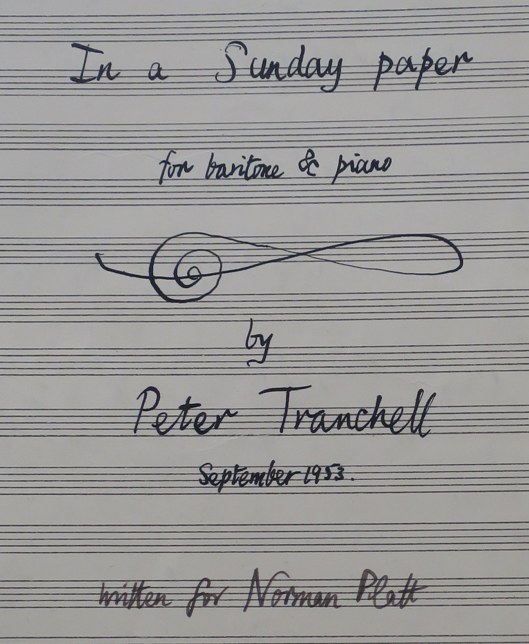In a Sunday Paper
- Posted in:
- free score
- secular
- song
- piano
- 1950s
In a Sunday Paper is a cycle of 8 songs for baritone and piano, written in September 1953, with words taken from articles in Sunday newspapers of 9th Aug 1953. The songs were written for Norman Platt, opera baritone, and later the founder of Kent Opera, though there is no evidence of a performance by Platt.

In his analysis of Tranchell's works, Peter Marchbank wrote:
The whimsy of the texts is well-matched by the lightness of touch in the music, with the piano accompaniments setting the scene for each little tale that is about to unfold. In the third song, the composer instructs the singer to sing “with the joy of a huge joke” the news that withdrawals had exceeded savings. The fourth song sets a somewhat risqué horoscope that Peter would undoubtedly have enjoyed, while the sixth song has a text with bowdlerised alternatives, reminding us that the songs were composed before the legalisation of homosexuality. The songs (omitting 3 and 4) were given their first performance by Peter Lehmann Bedford and Michael Pilkington at Park Lane House on 30th April 1960. Later, in July, the same performers gave them in Munich from where Peter Lehmann Bedford wrote to tell the composer that one young lady in the audience had cried at the end of Number 7.
Scores
Typesetting the songs is in progress. Individual songs will be presented here first in draft, then finalised and combined as a single edition.
I. Four foot high skeleton at High Wycombe
IV. Your own horoscope
V. Police use hoses against seven hundred
Please also see our guidance on the use of scores.
Notes
Tranchell's notes on the inside cover:
a) No 2 may be transposed down a semitone if desired.
b) No 6 may be omitted, if desired, in which case no 8 may be sung in its place, the cycle thus closing with no 7.
c) Metronome marks & expression marks are subject to performers' taste.
And in a pencilled addition:
Numbers 1 - 4, 6 - 7 from News of the World, 9th Aug 1953
Number 5 from the Daily Telegraph, 8th or 10th Aug 1953.
A pencilled note on No 4 says
This song is the first to omit.
A pencilled note on No 8 says
This piece is a collage or mélange of bits from several reports.